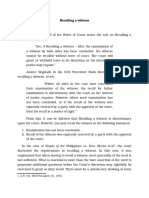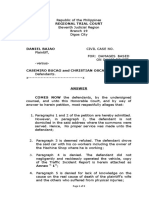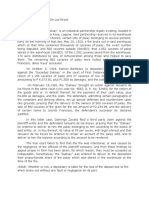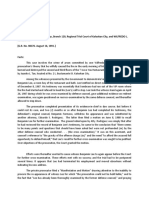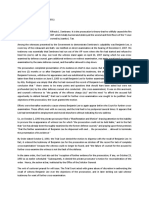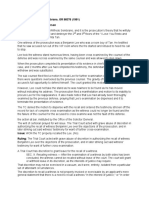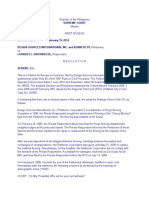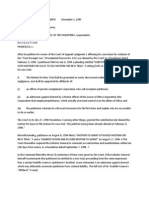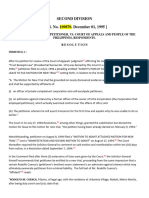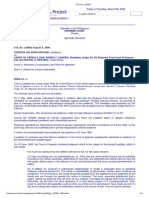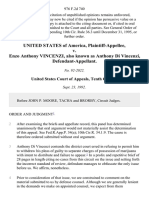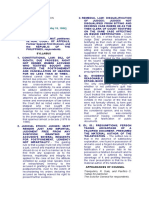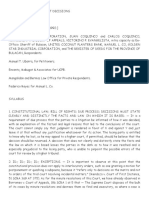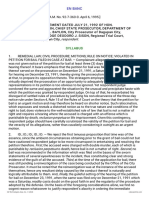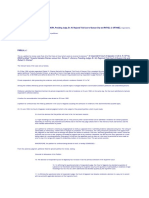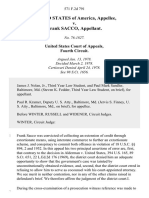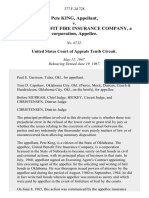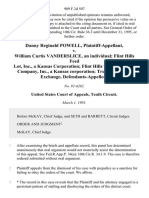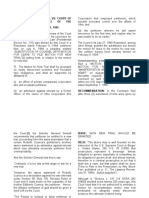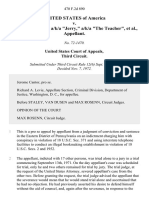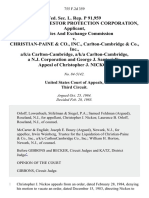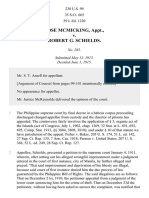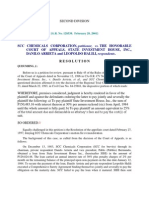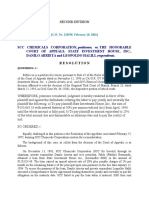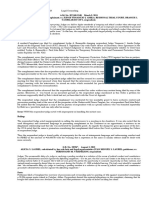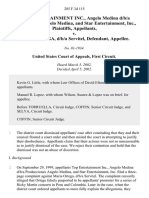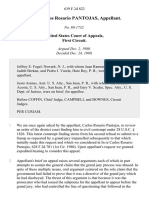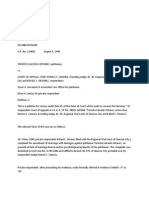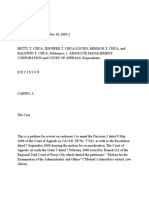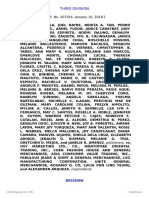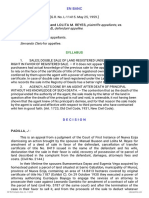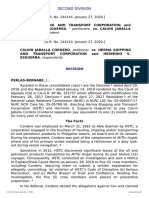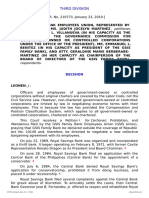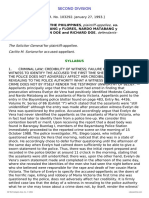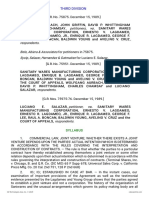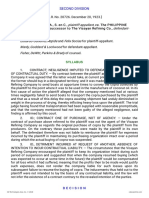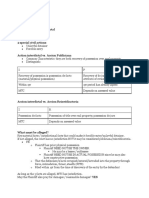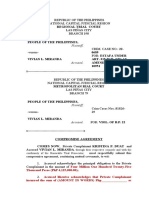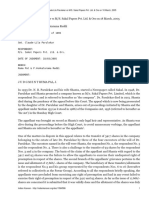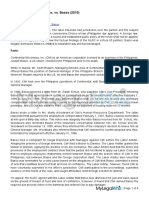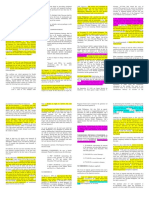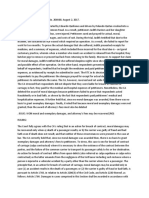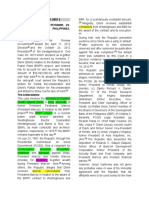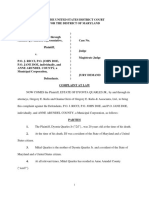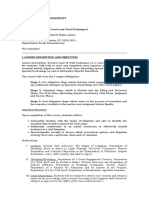G.R. No. 98376 - People v. Rivera
G.R. No. 98376 - People v. Rivera
Uploaded by
Mayumi RellitaCopyright:
Available Formats
G.R. No. 98376 - People v. Rivera
G.R. No. 98376 - People v. Rivera
Uploaded by
Mayumi RellitaCopyright
Available Formats
Share this document
Did you find this document useful?
Is this content inappropriate?
Copyright:
Available Formats
G.R. No. 98376 - People v. Rivera
G.R. No. 98376 - People v. Rivera
Uploaded by
Mayumi RellitaCopyright:
Available Formats
FIRST DIVISION
[G.R. No. 98376. August 16, 1991.]
PEOPLE OF THE PHILIPPINES, petitioners, vs. HON. BAYANI S.
RIVERA, Judge, Branch 129, Regional Trial Court of
Kalookan City, and WILFREDO L. SEMBRANO, respondent.
The Solicitor General for petitioner.
Eduardo S. Rodriguez for private respondent.
DECISION
NARVASA, J : p
The special civil action of certiorari at bar instituted in this Court to annul an
order rendered by the Regional Trial Court at Kalookan City, Branch 129, in a
prosecution for arson docketed in that Court as Criminal Case No. 28820 (87).
Accused in that case of arson is Wilfredo L. Sembrano. It is the prosecution's
theory that he wilfully caused the fire in the early morning of May 21, 1987
which totally burned and destroyed the second and third floors of the "I Love
You Restaurant and Sauna Bath" owned by Juanito L. Tan, located at No. 2 L.
Bustamante St. Kalookan City. 1
Among the witnesses presented by the Government to demonstrate
Sembrano's culpability was Benjamin Lee, a room boy of the restaurant and
bath. Lee testified on direct examination at the hearing of December 8, 1987.
His testimony was essentially that Sembrano had run out of the VIP room where
the fire had started and refused to heed his (Lee's) call to stop. Lee took the
witness stand again on April 26, 1987 during which he was cross-examined by
defense counsel, gave additional evidence on redirect examination, was again
questioned on recross-examination by the same defense counsel, and
thereafter allowed to step down. 2
The prosecution completed presentation of its evidence-in-chief in due course.
But before it could rest its case, and two (2) months or so after Benjamin Lee
had completed his testimony, the defendant's original counsel, Benjamin
Formoso, withdrew his appearance and was substituted by another attorney,
Eduardo S. Rodriguez. 3 The latter then filed a motion on June 8, 1988 to recall
Benjamin Lee for further examination. 4 The ground relied upon by Atty.
Rodriguez was simply that after he had reviewed the record of Benjamin Lee's
testimony, he came to the conclusion that "there seems to be many points and
questions that should have been asked but were not profounded (sic) by the
other defense counsel who conducted . . . (the cross examination)." It was on
this averment, and counsel's reference to "the gravity of the offense charge
CD Technologies Asia, Inc. © 2021 cdasiaonline.com
(sic)" and the need "to afford the accused full opportunity to defend himself,"
that Lee's recall for further cross examination was sought to be justified. Over
objections of the prosecution, the Court 5 granted the motion. llcd
Efforts were thereafter exerted to cause witness Benjamin Lee to again appear
before the Court for further cross-examination. These efforts met with no
success; and the trial had to be postponed several times. It appears that Lee
had terminated his employment and moved elsewhere without indicating his
new address.
So, on October 1, 1990 the private prosecutor filed a "Manifestation and
Motion" drawing attention to the inability to procure the re-appearance of
witness Lee for which "the prosecution could not be held liable," and to the fact
that "Lee has already been thoroughly examined by the former defense
counsel," and praying upon these premises "that the further examination of
Benjamin Lee be dispensed with and . . . the prosecution . . . allowed to
terminate the presentation of its evidence."
By Order dated October 2, 1990, 6 the Trial Court denied the motion to dispense
with the recall of Benjamin Lee. In fact, it ordered "the testimony of Benjamin
Lee for the prosecution . . . stricken off the record for lack of complete cross-
examination" because the witness could no longer be found, and "the failure of
counsel for the accused to further cross-examine the witness is not the fault of
the defense." 7
In the same order, the Court also set the "reception of further evidence for the
prosecution, if any, . . . on October 23, 1990 . . . as earlier scheduled."
Subsequently it denied the private prosecutor's motion for reconsideration of
the order. 8 Hence, the action at bar, instituted by the Office of the Solicitor
General.
The writ of certiorari prayed for will issue. The Trial Court acted with grave
abuse of discretion in authorizing the recall of witness Benjamin Lee over the
objections of the prosecution, and in later striking out said witness' testimony
for want of further cross-examination.
There is no doubt that a Trial Court has discretion to grant leave for the recall
of a witness. This is clear from a reading of Section 9, Rule 132 of the Rules of
Court, as amended, 9 viz.:
"SECTION 9. Recalling witness. — After the examination of a
witness by both sides has been concluded, the witness cannot be
recalled without leave of the court. The court will grant or withhold
leave in its discretion, as the interests of justice may require."
But obviously that discretion may not be exercised in a vacuum, as it were,
entirely, isolated from a particular set of attendant circumstances. The
discretion to recall a witness is not properly invoked or exercisable by an
applicant's mere general statement that there is a need to recall a witness
"in the interest of justice," or "in order to afford a party full opportunity to
present his case," or that, as here, "there seems to be many points and
questions that should have been asked " in the earlier interrogation. To
CD Technologies Asia, Inc. © 2021 cdasiaonline.com
regard expressed generalities such as these as sufficient ground for recall of
witnesses would make the recall of witness no longer discretionary but
ministerial. Something more than the bare assertion of the need to propound
additional questions is essential before the Court's discretion may rightfully
be exercised to grant or deny recall. There must be a satisfactory showing of
some concrete, substantial ground for the recall. There must be a
satisfactory showing on the movant's part, for instance, that particularly
identified material points were not covered in the cross-examination, or that
particularly described vital documents were not presented to the witness
whose recall is prayed for, or that the cross-examination was conducted in
so inept a manner as to result in a virtual absence thereof. Absent such
particulars, to repeat, there would be no foundation for a trial court to
authorize the recall of any witness.
In the case at bar, the respondent Trial Court granted the defendant's motion
for recall on nothing more than said movant's general claim that certain
questions — unspecified, it must be stressed — had to be asked. In doing so it
acted without basis, exercised power whimsically or capriciously, and gravely
abused its discretion. cdll
So, too, the respondent Court acted whimsically, capriciously, and oppressively,
in other words, gravely abused its discretion, in ordering the striking out of the
entire testimony of Benjamin Lee after it appeared that he could no longer be
found and produced for further examination. In the first place, the Court acted
unilaterally, without any motion to this effect by the defense and thus without
according the prosecution a prior opportunity to show why the striking out
should not be decreed. More importantly, the striking out was directed without
any showing whatever by the defense of the indispensability of further cross-
examination, what it was that would have been elicited by further cross-
examination rendering valueless all that the witness had previously stated. It
should be stressed that Lee was subjected both to cross-examination and
recross-examination by former counsel of the accused Sembrano. Obviously the
latter was satisfied that there had been sufficient cross-examination of the
witness. Absence of cross-examination may not therefore be invoked as ground
to strike out Lee's testimony (as being hearsay). And there is no showing
whatever in this case that it was the prosecution that placed the witness
beyond the reach of the Court, much less of the expected nature or tenor of his
additional testimony which, because not presented, would necessarily cause
the evidence earlier given by Lee to become hearsay or otherwise incompetent,
and therefore, amenable to being stricken from the record.
WHEREFORE, the petition is GRANTED and the respondent Court's challenged
Order dated October 2, 1990 is NULLIFIED AND SET ASIDE, with costs against
private respondent. cdrep
IT IS SO ORDERED.
Cruz, Gancayco, Griño-Aquino and Medialdea, JJ ., concur.
Footnotes
CD Technologies Asia, Inc. © 2021 cdasiaonline.com
1. Rollo, p. 6.
2. Id., pp. 6-7.
3. Id., p. 7.
4. Id., pp. 8-9.
5. Then presided over by Hon. Domingo M. Angeles.
6. By Hon. Bayani S. Rivera, now presiding over Branch 129, RTC, Kalookan
City.
7. Rollo, p. 60.
8. Id., p. 61.
9. Amendments of the Rules of Evidence were made effective on July 1, 1989;
however, Section 9, Rule 132 contains no revision, and is exactly the same
as Sec. 14 of Rule 123 of the Rules of 1964.
CD Technologies Asia, Inc. © 2021 cdasiaonline.com
You might also like
- Request For Production of Documents in DiscoveryDocument4 pagesRequest For Production of Documents in DiscoveryVivek Suri100% (4)
- Recalling A WitnessDocument3 pagesRecalling A WitnessMaureen Pátajo100% (5)
- Baylon Vs Judge Sison A.M. No. 92-7-360-0 (April 6, 1995)Document3 pagesBaylon Vs Judge Sison A.M. No. 92-7-360-0 (April 6, 1995)elizabethmae100% (2)
- 07 - Remedial LawDocument388 pages07 - Remedial Lawfreegalado100% (2)
- Answer - Damages Based On Quasi-DelictDocument8 pagesAnswer - Damages Based On Quasi-DelictlordonorNo ratings yet
- La Sociedad Dalisay vs. de Los ReyesDocument2 pagesLa Sociedad Dalisay vs. de Los ReyesMariaFaithFloresFelisartaNo ratings yet
- People V RiveraDocument4 pagesPeople V RiveraMaria Reylan GarciaNo ratings yet
- People Vs Sembrano (Section 9 Rule 130 - Recalling Witness)Document3 pagesPeople Vs Sembrano (Section 9 Rule 130 - Recalling Witness)Jules VosotrosNo ratings yet
- People Vs RiveraDocument2 pagesPeople Vs RiveraRic SaysonNo ratings yet
- In Re Alberto de Jesus Berrios, 706 F.2d 355, 1st Cir. (1983)Document5 pagesIn Re Alberto de Jesus Berrios, 706 F.2d 355, 1st Cir. (1983)Scribd Government DocsNo ratings yet
- Spouses Rafols v. Barrios JRDocument6 pagesSpouses Rafols v. Barrios JRLeaNo ratings yet
- United States v. Henry J. Wright, JR., 573 F.2d 681, 1st Cir. (1978)Document5 pagesUnited States v. Henry J. Wright, JR., 573 F.2d 681, 1st Cir. (1978)Scribd Government DocsNo ratings yet
- PP Vs Hon Rivera and Embrano DDocument2 pagesPP Vs Hon Rivera and Embrano DMichael Parreño Villagracia100% (1)
- Cea Vs PaguioDocument3 pagesCea Vs PaguioMaribel Nicole LopezNo ratings yet
- Design Sources International V Eristingcol G.R. 193966Document5 pagesDesign Sources International V Eristingcol G.R. 193966Dino Bernard LapitanNo ratings yet
- Cuenca V CADocument5 pagesCuenca V CAattycpajfccNo ratings yet
- Cuenca vs. Court of Appeals, 250 SCRA 485, G.R. No. 109870 Dec 1, 1995Document4 pagesCuenca vs. Court of Appeals, 250 SCRA 485, G.R. No. 109870 Dec 1, 1995Arline B. FuentesNo ratings yet
- Salcedo-Ortanez V CADocument3 pagesSalcedo-Ortanez V CAJunery BagunasNo ratings yet
- Art 78 Verified 2019 - 03 - 02 - 19 - 32 - 02-1 PDFDocument703 pagesArt 78 Verified 2019 - 03 - 02 - 19 - 32 - 02-1 PDFSLAVEFATHER50% (2)
- Supreme CourtDocument4 pagesSupreme CourtAubrey AquinoNo ratings yet
- Evidence CasesDocument450 pagesEvidence CasesHazel Paguio-LastrolloNo ratings yet
- Combine February 25, 2022 (2) - 1Document36 pagesCombine February 25, 2022 (2) - 1Bunny Fontaine100% (1)
- In The Matter of Ignatius A. MONFORTE, Bankrupt-Appellant. Chemical Bank New York Trust Company, Objecting Creditor-AppelleeDocument3 pagesIn The Matter of Ignatius A. MONFORTE, Bankrupt-Appellant. Chemical Bank New York Trust Company, Objecting Creditor-AppelleeScribd Government DocsNo ratings yet
- United States v. Enzo Anthony Vincenzi, Also Known As Anthony Di Vincenzi, 976 F.2d 740, 10th Cir. (1992)Document4 pagesUnited States v. Enzo Anthony Vincenzi, Also Known As Anthony Di Vincenzi, 976 F.2d 740, 10th Cir. (1992)Scribd Government DocsNo ratings yet
- Maliwat Vs CaDocument8 pagesMaliwat Vs CaJoseph Rommel De LeonNo ratings yet
- G.R. No. 133154. December 9, 2005. JOWEL SALES, Petitioner, vs. CYRIL A. SABINO, RespondentDocument6 pagesG.R. No. 133154. December 9, 2005. JOWEL SALES, Petitioner, vs. CYRIL A. SABINO, RespondentJoshua Erik MadriaNo ratings yet
- Edwin Almeyda v. Frank O. Gunter, Executive Director, Colorado Department of Corrections, Canon City, Colorado, 977 F.2d 595, 10th Cir. (1992)Document6 pagesEdwin Almeyda v. Frank O. Gunter, Executive Director, Colorado Department of Corrections, Canon City, Colorado, 977 F.2d 595, 10th Cir. (1992)Scribd Government DocsNo ratings yet
- Nicos Industrial Corp. v. Court of Appeals, 206 SCRADocument9 pagesNicos Industrial Corp. v. Court of Appeals, 206 SCRAChatNo ratings yet
- Baylon vs. Judge Sison (Adm. Matter No. 92-7-360-0, April 6, 1995)Document10 pagesBaylon vs. Judge Sison (Adm. Matter No. 92-7-360-0, April 6, 1995)Kenny BesarioNo ratings yet
- Baylon V Judge Sison June 26, 2022Document7 pagesBaylon V Judge Sison June 26, 2022melrene jalmanzarNo ratings yet
- Horizons Titanium Corporation v. Norton Company, 290 F.2d 421, 1st Cir. (1961)Document7 pagesHorizons Titanium Corporation v. Norton Company, 290 F.2d 421, 1st Cir. (1961)Scribd Government DocsNo ratings yet
- Evidence Cases 2Document198 pagesEvidence Cases 2Chris ZialcitaNo ratings yet
- United States v. Frank Sacco, 571 F.2d 791, 4th Cir. (1978)Document4 pagesUnited States v. Frank Sacco, 571 F.2d 791, 4th Cir. (1978)Scribd Government DocsNo ratings yet
- Pete King v. United Benefit Fire Insurance Company, A Corporation, 377 F.2d 728, 10th Cir. (1967)Document8 pagesPete King v. United Benefit Fire Insurance Company, A Corporation, 377 F.2d 728, 10th Cir. (1967)Scribd Government DocsNo ratings yet
- United States v. Dunstan Wellington Burnett, 671 F.2d 709, 2d Cir. (1982)Document8 pagesUnited States v. Dunstan Wellington Burnett, 671 F.2d 709, 2d Cir. (1982)Scribd Government DocsNo ratings yet
- A.M. No. 92-7-360-0 Baylon V SisonDocument5 pagesA.M. No. 92-7-360-0 Baylon V SisonMarkNo ratings yet
- United States Court of Appeals, Tenth CircuitDocument4 pagesUnited States Court of Appeals, Tenth CircuitScribd Government DocsNo ratings yet
- Pale Digest Pool 35 65Document75 pagesPale Digest Pool 35 65janNo ratings yet
- LUZVIMINDA C. COMIA, Complainant, vs. JUDGE CONRADO R. ANTONA, RespondentDocument16 pagesLUZVIMINDA C. COMIA, Complainant, vs. JUDGE CONRADO R. ANTONA, RespondentEunice SagunNo ratings yet
- United States v. Jerome Cantor, A/K/A "Jerry," A/K/A "The Teacher", 470 F.2d 890, 3rd Cir. (1972)Document5 pagesUnited States v. Jerome Cantor, A/K/A "Jerry," A/K/A "The Teacher", 470 F.2d 890, 3rd Cir. (1972)Scribd Government DocsNo ratings yet
- United States Court of Appeals, Third CircuitDocument5 pagesUnited States Court of Appeals, Third CircuitScribd Government DocsNo ratings yet
- Crim Law Compiled CasesDocument272 pagesCrim Law Compiled CasesPaula Laine MarbellaNo ratings yet
- G.R. No. 140274Document3 pagesG.R. No. 140274mehNo ratings yet
- RECUSAL Motion To Disqualify JudgeDocument7 pagesRECUSAL Motion To Disqualify JudgeBANKUNITED_FRAUDNo ratings yet
- 1 - Manguerra v. RisosDocument4 pages1 - Manguerra v. RisosAmberChanNo ratings yet
- McMicking v. Schields, 238 U.S. 99 (1915)Document5 pagesMcMicking v. Schields, 238 U.S. 99 (1915)Scribd Government DocsNo ratings yet
- Pendleton v. United States, 216 U.S. 305 (1910)Document5 pagesPendleton v. United States, 216 U.S. 305 (1910)Scribd Government DocsNo ratings yet
- Evidence Set1Document113 pagesEvidence Set1Louisa Matubis100% (1)
- SCC Chemicals Corp Vs CADocument6 pagesSCC Chemicals Corp Vs CAiamchurkyNo ratings yet
- Cheney v. Anchor Glass Container, 71 F.3d 848, 11th Cir. (1996)Document4 pagesCheney v. Anchor Glass Container, 71 F.3d 848, 11th Cir. (1996)Scribd Government DocsNo ratings yet
- Petitioners vs. vs. Respondents Zosa & Quijano Law Offices Basilio E. DuabanDocument9 pagesPetitioners vs. vs. Respondents Zosa & Quijano Law Offices Basilio E. DuabanAlexandra Nicole CabaelNo ratings yet
- CounselingDocument2 pagesCounselingJovy Norriete dela CruzNo ratings yet
- Rule 30 To 36 Case Digest Civil ProcedureDocument20 pagesRule 30 To 36 Case Digest Civil ProcedureRio Barrot100% (1)
- SCC Chemicals vs. CA G.R. No. 128538 February 28, 2001Document6 pagesSCC Chemicals vs. CA G.R. No. 128538 February 28, 2001Nikki BinsinNo ratings yet
- Top Entertainment Co v. Ortega, 285 F.3d 115, 1st Cir. (2002)Document6 pagesTop Entertainment Co v. Ortega, 285 F.3d 115, 1st Cir. (2002)Scribd Government DocsNo ratings yet
- Remrev2 Case DigestsDocument12 pagesRemrev2 Case DigestsAdee Jocson100% (1)
- In Re Carlos Rosario Pantojas, 639 F.2d 822, 1st Cir. (1980)Document5 pagesIn Re Carlos Rosario Pantojas, 639 F.2d 822, 1st Cir. (1980)Scribd Government DocsNo ratings yet
- Salcedo - Ortanez vs. Court of AppealsDocument6 pagesSalcedo - Ortanez vs. Court of Appealsthelawyer07No ratings yet
- Demurrer To Evidence SandiganbayanDocument3 pagesDemurrer To Evidence Sandiganbayanrobertoii_suarezNo ratings yet
- Chua vs. Absolute ManagementDocument5 pagesChua vs. Absolute ManagementMarites regaliaNo ratings yet
- Supreme CourtDocument13 pagesSupreme CourtDawn Jessa GoNo ratings yet
- G.R. No. 204555 - Parayday v. Shogun Shipping Co., IncDocument20 pagesG.R. No. 204555 - Parayday v. Shogun Shipping Co., IncMayumi RellitaNo ratings yet
- G.R. No. 194884 - Imasen Philippine Manufacturing Corp. v. AlconDocument9 pagesG.R. No. 194884 - Imasen Philippine Manufacturing Corp. v. AlconMayumi RellitaNo ratings yet
- G.R. No. 223073 - PJ Lhuillier, Inc. v. CamachoDocument11 pagesG.R. No. 223073 - PJ Lhuillier, Inc. v. CamachoMayumi RellitaNo ratings yet
- G.R. No. 207354 - Hubilla v. HSY Marketing LTD., CoDocument17 pagesG.R. No. 207354 - Hubilla v. HSY Marketing LTD., CoMayumi RellitaNo ratings yet
- G.R. No. 215568 - Rivera v. Genesis Transport Service, IncDocument10 pagesG.R. No. 215568 - Rivera v. Genesis Transport Service, IncMayumi RellitaNo ratings yet
- Buason vs. PanuyasDocument3 pagesBuason vs. PanuyasMayumi Rellita100% (1)
- G.R. Nos. 244144 & 244210 - Herma Shipping and Transport Corp. v. CorderoDocument9 pagesG.R. Nos. 244144 & 244210 - Herma Shipping and Transport Corp. v. CorderoMayumi RellitaNo ratings yet
- G.R. No. 210773 - GSIS Family Bank Employees Union v. VillanuevaDocument22 pagesG.R. No. 210773 - GSIS Family Bank Employees Union v. VillanuevaMayumi RellitaNo ratings yet
- Bisaya Land Transportation Co., Inc. vs. Sanchez PDFDocument10 pagesBisaya Land Transportation Co., Inc. vs. Sanchez PDFMayumi RellitaNo ratings yet
- G.R. No. 103292 - People v. Cabuang y FloresDocument10 pagesG.R. No. 103292 - People v. Cabuang y FloresMayumi RellitaNo ratings yet
- Bautista vs. Nicorp Management and Development CorporationDocument8 pagesBautista vs. Nicorp Management and Development CorporationMayumi RellitaNo ratings yet
- G.R. No. 96492 - Reyes v. Court of AppealsDocument7 pagesG.R. No. 96492 - Reyes v. Court of AppealsMayumi RellitaNo ratings yet
- Compania Maritima vs. LimsonDocument9 pagesCompania Maritima vs. LimsonMayumi RellitaNo ratings yet
- Bedia vs. WhiteDocument4 pagesBedia vs. WhiteMayumi RellitaNo ratings yet
- Bautista vs. Nicorp Management and Development CorporationDocument8 pagesBautista vs. Nicorp Management and Development CorporationMayumi RellitaNo ratings yet
- Aurbach v. Sanitary WaresDocument14 pagesAurbach v. Sanitary WaresMayumi RellitaNo ratings yet
- Albaladejo y Cia vs. Philippine Refining CoDocument10 pagesAlbaladejo y Cia vs. Philippine Refining CoMayumi RellitaNo ratings yet
- Advent Capital and Finance Corp. v. AlcantaraDocument5 pagesAdvent Capital and Finance Corp. v. AlcantaraMayumi RellitaNo ratings yet
- Saludo V PNBDocument14 pagesSaludo V PNBHudson CeeNo ratings yet
- April 10, 2021 Rule 70 - Accion Interdictal Substantial Aspect 2 Special Civil ActionsDocument45 pagesApril 10, 2021 Rule 70 - Accion Interdictal Substantial Aspect 2 Special Civil Actionsdaryl canozaNo ratings yet
- Return of SummonsDocument2 pagesReturn of SummonsDiazNo ratings yet
- Obli 11 7 22Document21 pagesObli 11 7 22LEVI ACKERMANNNo ratings yet
- A Guide To Practitioners - Limited Grants of RepresentationDocument29 pagesA Guide To Practitioners - Limited Grants of Representationmichael s. alleyneNo ratings yet
- WILLY TAN y CHUA, Petitioner, Vs PEOPLE OF THE PHILIPPINES, Respondents (CP)Document2 pagesWILLY TAN y CHUA, Petitioner, Vs PEOPLE OF THE PHILIPPINES, Respondents (CP)Lalj BernabecuNo ratings yet
- Mari vs. Hon. Gonzales, G.R. No. 187728, September 12, 2011Document2 pagesMari vs. Hon. Gonzales, G.R. No. 187728, September 12, 2011Lloyd David P. VicedoNo ratings yet
- KOPPEL, INC. (Formerly Known As KPL AIRCON, INC.)Document8 pagesKOPPEL, INC. (Formerly Known As KPL AIRCON, INC.)Alyssa TorioNo ratings yet
- REVISED-compromise-Agreement Duat Miranda 2Document4 pagesREVISED-compromise-Agreement Duat Miranda 2Pink Reader LIbrary VIPNo ratings yet
- Bungcayao v. Fort Ilocandia, GR No. 170483Document5 pagesBungcayao v. Fort Ilocandia, GR No. 170483Pauline Licaycay100% (1)
- B'smt. Claude-Lila Parulekar Vs M S. Sakal Papers Pvt. Ltd. & Ors On 18 March, 2005'Document25 pagesB'smt. Claude-Lila Parulekar Vs M S. Sakal Papers Pvt. Ltd. & Ors On 18 March, 2005'Sonali DixitNo ratings yet
- C. 2. Ouano vs. CADocument2 pagesC. 2. Ouano vs. CARhea CalabinesNo ratings yet
- Petitioner Vs Vs Respondent: Second DivisionDocument7 pagesPetitioner Vs Vs Respondent: Second DivisionMark De JesusNo ratings yet
- 06 Continental Micronesia v. Basso (2015)Document6 pages06 Continental Micronesia v. Basso (2015)enggNo ratings yet
- SPS. LAM v. KODAKDocument7 pagesSPS. LAM v. KODAKpaescorpisoNo ratings yet
- Darines vs. QuiñonesDocument2 pagesDarines vs. QuiñonesAmado EspejoNo ratings yet
- The Skeleton ArgumentDocument12 pagesThe Skeleton Argumenthunainzia744No ratings yet
- Dasini VS PhilDocument42 pagesDasini VS PhilSherlock YookieNo ratings yet
- The Hon'Ble Supreme Court of Trentland: BeforeDocument24 pagesThe Hon'Ble Supreme Court of Trentland: BeforeAyushman Dubey100% (2)
- Judgement by Kitto J - Tallerman and Co. Pty. Ltd. v. Nathan's Merchandise (Victoria) Pty. Ltd. - (18 February 1957)Document8 pagesJudgement by Kitto J - Tallerman and Co. Pty. Ltd. v. Nathan's Merchandise (Victoria) Pty. Ltd. - (18 February 1957)SREEMANTINI MUKHERJEENo ratings yet
- Dyonta Quarles Wrongful Death LawsuitDocument12 pagesDyonta Quarles Wrongful Death LawsuitReport Annapolis NewsNo ratings yet
- Answer Denying Genuineness and Due Execution of InstrumentDocument2 pagesAnswer Denying Genuineness and Due Execution of Instrumentpante enriNo ratings yet
- Wambora-Civil Appeal 24 of 2014Document12 pagesWambora-Civil Appeal 24 of 2014motego 1No ratings yet
- Civil Procedure Code, 1908Document59 pagesCivil Procedure Code, 1908Bhavya SurekaNo ratings yet
- Syllabus 1st SemDocument3 pagesSyllabus 1st SemMikaela PamatmatNo ratings yet
- In The High Court at Calcutta: Civil Appellate Jurisdiction Original SideDocument15 pagesIn The High Court at Calcutta: Civil Appellate Jurisdiction Original SidesumitkejriwalNo ratings yet

